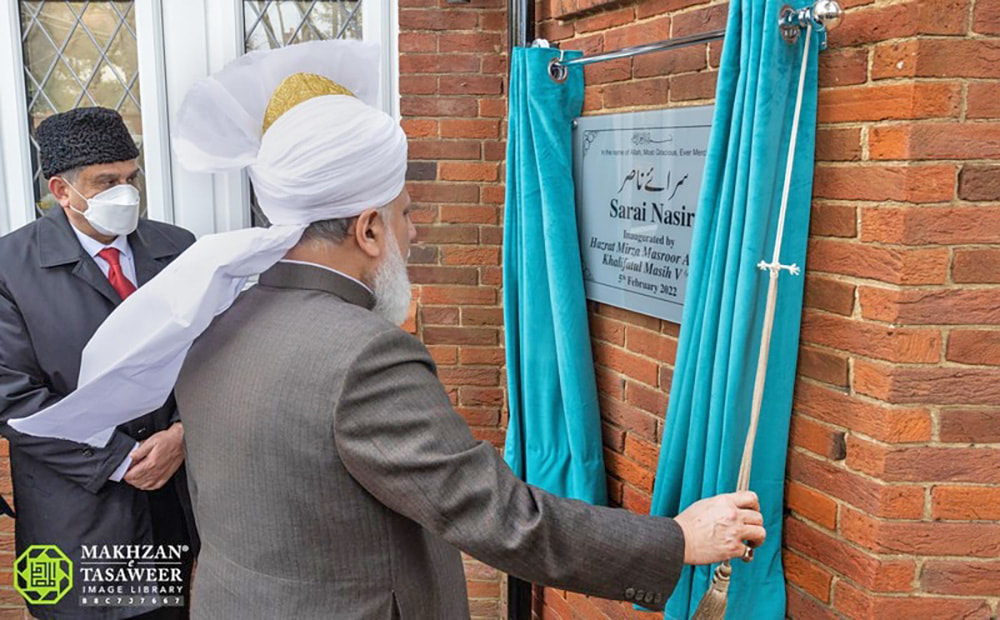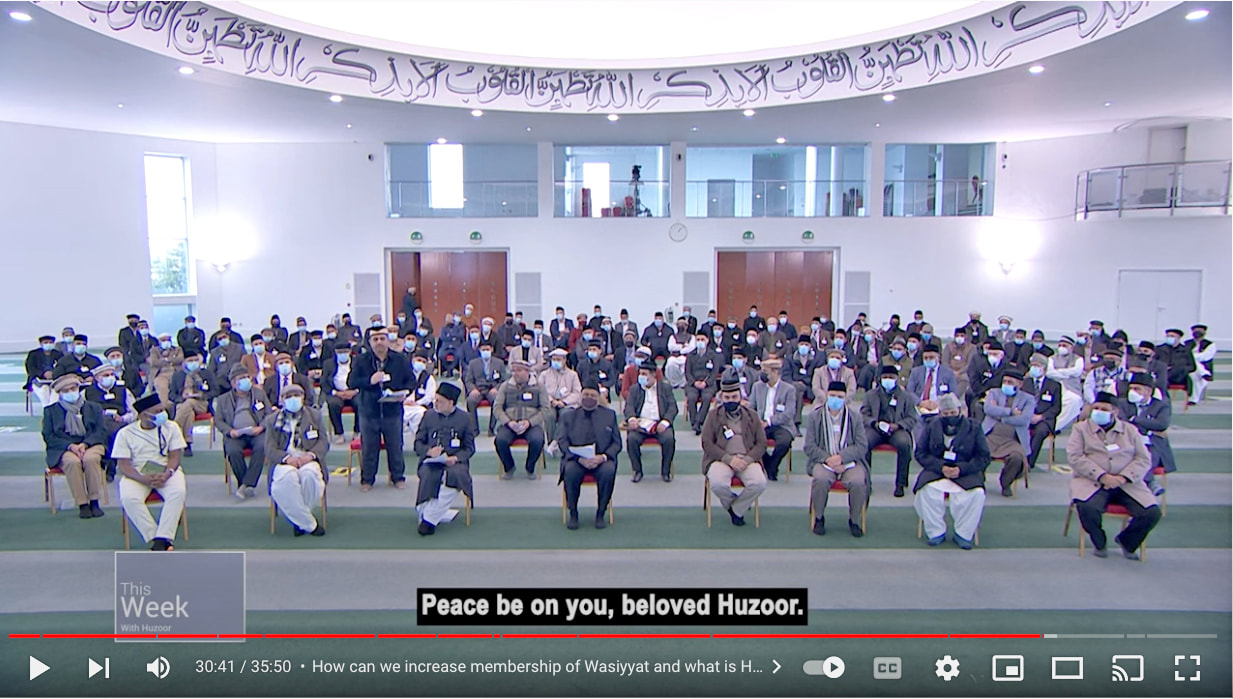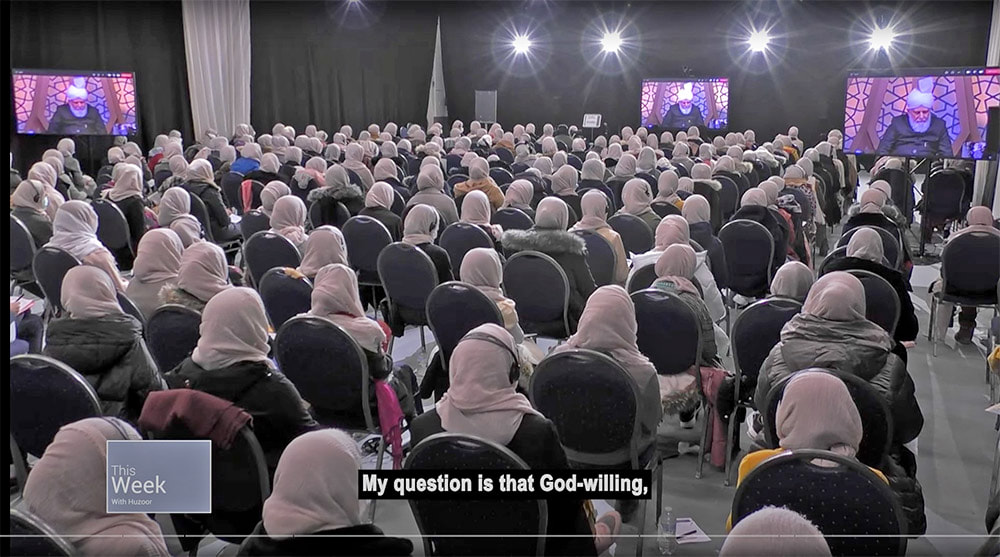Please click on link below in brackets for full video start to finish or for segments within the contents, please click on any timed link for precise placement.
Where the YouTube link is in English, Urdu subtitles are often included and vice-versa.
Where the YouTube link is in English, Urdu subtitles are often included and vice-versa.
FEBRUARY 2022 LISTINGS
FEBRUARY 11th: (Link to full MTA UK YouTube programme)
- Inauguration of Sarai Nasir guest house of Majlis Ansarullah UK.
- Virtual meeting with Majlis-e-Amila of New Zealand Jama'at.
- Friday Sermon (brief extract on Hazrat Abu Bakr(ra).
- 0 - Intro.
- 1:05 – Huzoor (aba) inaugurates Sarai Nasir and inspects the building.
- 4:24 – Introduction of Mulaqat with Amila members New Zealand.
- 5:16 – Conversation with Dr. Nadeem Ahmad, General Sec.
- 6:12 – Conversation with Azeem Zafrullah, Sadr Khuddamul Ahmadiyya.
- 8:15 – Conversation with Muhammad Yasin, Sec. Waqfe Nau.
- 9:14 – Conversation with Shakeel Khan, Sec. Maal.
- 10:27 – Conversation with Irfan Sheikh, Auditor.
- 11:23 – Conversation with Najm ul Islam, Sec. Umoor-e-Aamah.
- 13:58 – Conversation with Nuruddin Boateng, Sec. Isha’at.
- 15:48 –- Conversation with Taslim Ahmad, Muavin Sadr Press & Media.
- 17:00 – Conversation with Muhammad Asad, Mohtamim Sehat-e-Jismani.
- 17:36 –- Conversation with Mufeed Ahmad, Mohtamim Atfal.
- 18:04 – Conversation with Suhaib Ahmad, Add. Mohtamim Tarbiyat Rishta Nata.
- 19:09 – Conversation with Shafiq-ur-Rehman, Missionary.
- 19:56 – Concluding remarks of the Mulaqat.
- 21:04 – Friday Sermon Clip 11 February 2022.
- An extended report of the virtual meeting with Majlis-E-Amila from New Zealands from Al-Hakam can be read by CLICKING HERE.
- The Friday Sermon of 11 Feb in more than 10 languages can be ACCESSED HERE.
FEBRUARY 18th: (Link to full MTA UK YouTube programme)
- Virtual meeting with UK new Ahmadi Muslims.
- Virtual meeting with local presidents of Uk Jama'at.
- Friday Sermon – prophecy of Musleh Maud (ra).
- 0:00 – Intro.
- 0:57 – Introduction of Mulaqat with new Ahmadi converts in UK.
- 1:23: – Zubair Zafar Sahibs journey to Islam Ahmadiyyat.
- 4:23 – Asthma Begum Sahibs journey to Islam Ahmadiyyat.
- 6:10 – How can we overcome depression and have patience?
- 7:31 – What is the commandment for men with regard to purdah?
- 10:53 – The Promised Messiah’s (as) era was to last a thousand years, will the time of the Day of Judgment be after this?
- 12:37– What is Huzoor’s (aba) advice to a new Ahmadi to build a relationship with God?
- 14:17 – Introduction of Mulaqat with local presidents of UK Jama’at.
- 14:28 – What is Huzoor’s (aba) guidance concerning the increasing possibilities of a third world war?
- 16:44 – What is Huzoor’s (aba) advice to parents in regards to finding a spouse?
- 20:44 – Some Jama’at members are upset with office-bearers, how can the situation be resolved?
- 27:55 – How can we advice those families that do not cooperate or attend the mosque and events?
- 30:39 – How can we increase membership of Wasiyyat and what is Huzoor’s (aba) advice?
- 33:09 – Concluding remarks of Mulaqat with local presidents.
- 33:41 – Friday Sermon Clip 18 February 2022.
- The Friday Sermon of 18th Feb in more than 10 languages can be ACCESSED HERE.
- Meeting with Khuddam UK delegation before Tabligh journey to Argentina.
- Virtual meeting with Nasirat from Germany.
- Virtual meeting with Lajna Germany.
- Friday Sermon – Hazrat Abu Bakr(ra).
- 0:00 – Intro.
- 1:17 – Mulaqat with Khuddam UK delegation before departing for Argentina.
- 2:44 – Introduction of Mulaqat with Nasirat from Germany.
- 3:04 – Would Jama’at literature be available in Braille?
- 4:20 – How can a person learn wisdom in order to make wise decisions?
- 7:34 – How can one pass through difficult time and regain their faith?
- 10:17 – What Nazms does Huzoor (aba) like and frequently listen to?
- 11:20 – Can we greet people according to their traditions or would that be considered shirk?
- 13:12 – Why did the Lahori Jama’at separate themselves from us?
- 19:10 – When the Holy Prophet (sa) received divine revelation, he (sa) would begin to sweat, why was it so and did the Promised Messiah (as) experience similar condition?
- 21:34 – Introduction of Mulaqat with Lajna members from Germany.
- 21:49 – Can any allegation be levelled against Islam or be criticised?
- 25:57 – What can we do to develop humbleness and meekness?
- 26:58 – Why are atrocities inflicted upon Ahmadis?
- 29:57 – What can we do in response to the cartoons published against the Holy Prophet (sa)?
- 31:51 – Concluding remarks of Mulaqat with Lajna from Germany.
- 32:10 – Friday Sermon Clip - Request for prayers regarding current Russia-Ukraine condition.
Questions asked during the above two sessions but not covered in the Youtube video appear in the Al-Hakam articles of the above events. Readers are encouraged to read these articles at the Al-Hakam website as they go in more details than what we have presented here. (Direct link to the article is in the date header)
Al-Hakam (19th February, Nasirat from Germany)
- QUESTION: Inbisat asked Huzoor(aba) how she could explain to her class fellows that her wearing of hijab was her personal choice and not something forced upon her. She said that she had tried to explain that she wore the hijab as an act of personal choice; however, they would reply by saying that she was lying.
Huzoor (aba) explained that if they did not desire to believe what she was telling them then there was no need to engage in a debate over it. “You should not have any complexes; you should not feel inferior, thinking that ‘girls would tease us.’”
- QUESTION: Nirmal Virk asked Huzoor(aba) if it was compulsory to wear a coat if one was already wearing appropriate loose clothing and a scarf.
- QUESTION: Shafia Khan asked Huzoor Aqdas (aba) how one could attain the closeness of Allah.
- QUESTION: Elize Awan asked Huzoor Aqdas (aba) what should be done if something wrong was being taught in school regarding Islam?
- QUESTION: Maria Langah asked if God still rewarded a person who recited the Holy Qur'an but was unable to recite it with its correct pronunciation.
- QUESTION: Sania Anas asked Huzoor (aba) when he would come to Germany?
- QUESTION: Amtul Wakeel Bhatti asked Huzoor (aba) why we looked right and left whilst saying salaam at the end of salat.
- QUESTION: Tuba Malhi asked that if Allah was One, then why had He referred to Himself as “We” in some places in the Holy Qur'an.
- QUESTION: Hibah Nasir said that when we heard the name of the Holy Prophet Muhammad (sa), we prayed for peace and blessings to be sent upon him by Allah the Exalted. Should one should not also say something similar when hearing or saying the name of Allah Almighty.
“Allah and His angels send blessings on the Prophet. O ye who believe, you too should invoke blessings on him and salute him with the salutation of peace.” (Surah al-Ahzab, Ch.33: V.57)
Huzoor (aba) then said:
“It is the command of Allah to proclaim صلّی اللّٰهَ عَليه وسلّم. And the Holy Prophet Muhammad (sa) said that ‘if you send blessings on me and pray, then your prayers will also be accepted because Allah has said so.”
Huzoor (aba) said that Allah had stated that He even Himself sent blessings upon the Holy Prophet (sa). Huzoor (aba) said that when one said Allah’s name, they should do so respectfully; and added that there were more blessings in saying Allah Ta’ala than in just saying Allah. Huzoor (aba) narrated that when he was young, there was house in Rabwah and on the wall of this house, it was written, “There are great blessings in saying ‘Allah Ta’ala’.”
- QUESTION: Attiya tul Malik Muhammad asked Huzoor (aba) how one could be safeguarded from the negative use of mobile phones.
Huzoor (aba) said that if one knew the negatives and positives of a matter, then one should “Develop willpower, instil strength in yourself and make a firm decision that I should not do anything bad,” otherwise the negative usage of it could cause one to forget to offer their prayers and to recite the Holy Qur'an. Extensive usage of mobile phones could also cause damage to one’s eyes.
- QUESTION: Attiya tul Wakeel Bilal stated that in a Hadith, one reads that when the Holy Prophet (sa) would receive a revelation, he would begin to sweat despite cold weather. She asked why such a condition came about and further asked if this was the same condition of the Promised Messiah (as) upon receiving revelation.
- QUESTION: Alisha Malik asked Huzoor (aba) what the meaning was of the revelation of the Promised Messiah (as):آسمان سے دُودھ اُترا ہے، محفوظ ركهو
“Milk has descended from heaven, guard it.” [Tadhkirah [English], p. 816]
Al-Hakam (20th February, Lajna from Germany)
- QUESTION: Afsha Baloch Sahiba asked Huzoor (aba) if the charity of a person who gave a lot of alms but was weak in offering their five daily prayers, would be accepted?
“But, along with this [giving charity], if you are also fulfilling the rights of Allah, fulfilling the rights of your worship, then your rewards will multiply many times more.
“Apart from this, Allah certainly does accept charity and alms and He has commanded to give charity. Allah also says those people’s namaz is not accepted and will be thrown back on their face who do not take care of orphans and the poor – their namaz isn’t accepted either. Thus, Allah has joined the two together.
“[…] Sometimes Allah enables one to do further good deeds as a result of their charity and alms being accepted. There is an incident that the Promised Messiah (as) has also written about.”
There was a fire worshipper. One day, it was raining heavily and so, out of sympathy he went onto the roof to throw seeds for the birds to eat as the ground was full of water. Seeing him, a Muslim man questioned what he was doing and said his deeds had no reward as he was a fire worshipper and did not worship Allah. In response, the man said that the reward was down to Allah to give and he was just feeding the birds and was worried about them so that they didn’t die.
What happened next was that very Muslim once went to the Ka‘bah and was performing tawaf when he saw the man who was the fire worshipper. The Muslim man asked the other man what he was doing there. The man responded by saying that the deed of worrying for the birds and giving them something to eat resulted in Allah rewarding him and thus enabling him to accept Islam and perform the tawaf. This man, previously a fire worshipper, told the other Muslim that he had told him he would get no reward; however, Allah rewarded him with Islam for feeding and worrying for the birds.
Huzoor (aba) said charity and alms were not just for humans, but Allah was pleased by being charitable to animals too. Therefore, good deeds are certainly rewarded.
- QUESTION: Amtul Shafi Choudhry Sahiba asked why a child would be born disabled and stay disabled their whole life?
“Therefore, the law of shariah – the law of prayer – is working alongside this. But the law of nature is also being implemented and the law of nature is what science tells you about the reasons [for the illness]. Allah says ‘Yes, these are the reasons’.
“Allah had no enmity for someone that He made the child disabled. Yes, there are some weaknesses and some mistakes done by the parents […] which then affect the child. The law of nature is working in such a situation, and whether you believe in God or not, that law of nature will express itself and this is what scientists believe too.”
- QUESTION: Amatul Mateen Sahiba asked if Allah was angered with those who only worshipped him when in difficulty.
It is not right to go against the oaths made to Allah and we should always remain loyal to Him. If someone kept going against their promises to Allah then this was not a good attribute, Huzoor (aba) said. The element of punishment was Allah’s choice, He can punish in the next world too if He wanted.
- QUESTION: Dania Amar Sahiba asked what books of the Promised Messiah (as) she should read.
- QUESTION: Iqra Asjad Sahiba told Huzoor (aba) that some years ago her school teacher referenced Surah Sad, verse 53 saying that the Qur'an only mentioned men would be given “chaste women, restraining their looks” and that there was no mention of women being given rewards in heaven. The teacher concluded from this that women are not given equal rights in Islam. Iqra Asjad Sahiba asked Huzoor (aba) what response could be given.
“At another place in the Holy Qur'an, Allah has said men and women who do good deeds will all go to heaven. […]
“Take these verses out and show them there are verses where Allah has given the commandment that all such people will go to heaven. On lots of occasions, Allah has said women will go to heaven. How can she say this? You should take these references out, and show them.”
Huzoor (aba) said many verses promised women heaven and rewards so focusing on one verse of the Qur'an was not fair.
By this time Huzoor (aba) had opened the reference of Surah Sad (verse 53) and then explained the meaning: “Here women are being spoken about, right? […] Those husbands who have pious wives, will receive those very wives to serve them and the pious wives who have pious husbands will get their husbands. That is why Allah has given women’s rights in the very place where He mentioned men will get pious partners – in the same place He mentioned that women will get pious partners […]
“So, Allah says pious women will get pious men too […] Allah will establish partners like this. And a wife and husband who are both pious, they will be together anyway in heaven – there’s no question of women there. The women who are unmarried and are pious, Allah will give them pious men” and vice versa.
“And they will be from those very Muslims. Nowhere has Allah written that women will go to hell.”
Huzoor (aba) read out the translation of verse 36 of Surah al-Ahzab to show how men and women were given equal rights in terms of reward and blessings in heaven. The verse reads:
“Surely, men who submit themselves [to God] and women who submit themselves [to Him], and believing men and believing women, and obedient men and obedient women, and truthful men and truthful women, and men steadfast [in their faith] and steadfast women, and men who are humble and women who are humble, and men who give alms and women who give alms, and men who fast and women who fast, and men who guard their chastity and women who guard their chastity, and men who remember Allah much and women who remember [Him]—Allah has prepared for [all of] them forgiveness and a great reward.”
Speaking to Iqra Sahiba who asked the question, Huzoor (aba) said these verses should be presented to those who said women were not given equal rights and rewards in heaven compared to men and there were many other verses of the Qur\an that could be given to prove this.
- QUESTION: Attia Muskan Ahmed Sahiba asked why the Sunnah of Salat are not declared as Fardh (compulsory) and if one were not to offer them would it be a sin?
- QUESTION: Madiha Zaheer Tabasum Sahiba asked how she could improve her Islamic hijab in the Western environment and the age of social media.
“No one is being harmed. I am the one wearing the clothes, the scarf, the hijab. Why would someone else have a problem with this?’ So, you should have this confidence – and openly, with confidence tell this to people. There is no need to be scared or fearful because it is through this way that we will spread and teach the true teachings of Islam to the world. And good-natured and moral people like this aspect [and say] ‘Yes, you people follow and act on the true teachings of Islam’.”
Huzoor (aba) stressed Ahmadi Muslim women should develop confidence in themselves and pray Allah makes them a true Muslim. Commenting on how to improve the Islamic hijab, Huzoor (aba) said the Promised Messiah (as) had instructed the hijab should at least cover the forehead and the chin. In this way, the eyes and mouth would not be covered leaving room for easy breathing, etc.
On a lighter note, Huzoor(aba) said the current circumstances meant everyone was observing something close to the Islamic hijab by wearing masks due to Covid-19 – therefore there should be no complex or problem at all with covering one’s face and mouth as it has become a habit, Huzoor (aba) said with a smile. “So, if you go to the shops for a little while, cover a little more, what difference is there.” But if not, then women could cover their forehead around to their chin leaving the central area of the face uncovered but this was only for when there was no makeup applied.
Regarding anti-Muslim laws against Muslim women wearing the hijab in Europe, Huzoor (aba) said Ahmadi women should write articles and publish them in newspapers giving arguments that would be convincing. For example, if people covered themselves – including their face – and wrapped up in the winter months to protect themselves from the cold, then what issue was there if Muslim women covered themselves. Huzoor (aba)a said if enough Ahmadi Muslim women wrote these articles, slowly, they would convince the world. nTalking about social media, Huzoor (aba) told Madiha Sahiba to write in support of the hijab on social media too.
- QUESTION: Asfa Atta-ul-Quddus Sahiba asked what areas needed to be focused on when trying to create a balance between religious and worldly life.
“Whatever you are about to do, think whether Allah has instructed that action or would He get angry with it.”
In terms of studies, Huzoor (aba) said students should focus on their studies, and after completing them and getting married, on taking care of the home was essential.
“You are to create a balance by serving faith and along with this while at home gain religious knowledge, focus on prayers, recite the Qur'an, try learning the meaning of the Holy Qur'an, try to acquire religious knowledge so that the girls who get married they can correctly raise their children and purify the atmosphere of their home. And if someone’s a student, then like I said fulfil the rights of being a student first and complete your studies. In general worldly affairs, I have said to pay attention to fearing Allah […] and see whether Allah will be happy with an action or not.”





